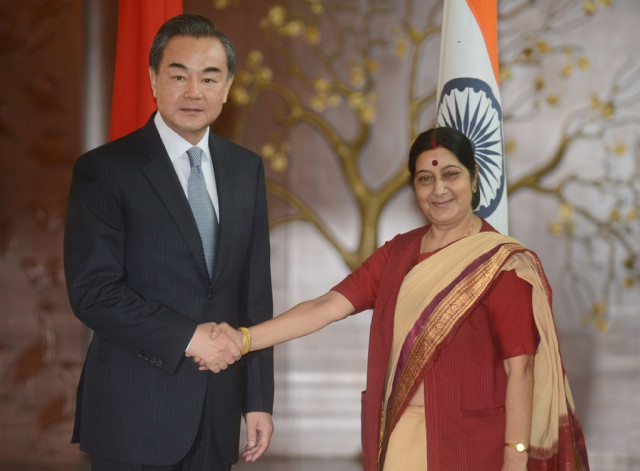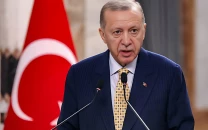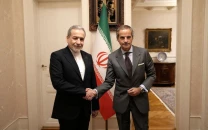Rivals India and China hold first major talks since Modi win
Chinese President Xi Jinping accepted Modi's invitation to visit India.

Visiting Chinese Foreign Affairs Minister Wang Yi (L) shakes hands with Indian Minister for External Affairs Sushma Swaraj during a meeting in New Delhi on June 8, 2014. PHOTO: AFP
China's Foreign Minister Wang Yi met his Indian counterpart in New Delhi during a two-day visit to build relations with the right-wing Modi government which came to power last month on a pledge to revive the economy.
Foreign ministry spokesperson Syed Akbaruddin said talks between Wang and India Foreign Minister Sushma Swaraj on economic and other issues were "productive and substantive".
"All issues of significance were raised and discussed in a frank and cordial manner," Akbaruddin told reporters.
"In our view this is a productive beginning between the new government of India and the Chinese government," he said without giving details.
The talks focused on trade ties but also touched on a border dispute between the nuclear-armed neighbours that has soured relations for decades.
Wang is expected on Monday to meet Modi, who has extended olive branches to traditional rivals China and Pakistan since coming to office despite his hardline nationalist reputation.
Modi has invited Chinese President Xi Jinping, himself a nationalist leader, to visit later this year, an offer that Wang told India media had been accepted.
Wang told the Hindu newspaper he had travelled to the capital as a special envoy of Xi to "cement our existing friendship and explore further cooperation".
"China is ready to work with our Indian friends for an even brighter future of our strategic and cooperative partnership," Wang said in an interview with the paper published Sunday.
Analysts say Modi's landslide election win has given him a mandate for more muscular foreign policy. He held talks with his Pakistani counterpart last month after inviting leaders of regional neighbours to his inauguration.
But he faces a tough task of dealing with an increasingly assertive and well-armed China, which is looking to play a larger role in South Asia, while still trying to strengthen economic ties with Beijing.
China is India's biggest trading partner with two-way commerce totalling close to $70 billion. But India's trade deficit with China has soared to over $40 billion from just $1 billion in 2001-02, Indian figures show.
Experts say Modi must bridge the deficit by seeking greater access to the Chinese market, with the two sides targeting annual bilateral trade of $100 billion by 2015.
Relations however are still dogged by mutual suspicion -- a legacy of a brief, bloody border war in 1962 over the Indian northeastern state of Arunachal Pradesh.
Modi warned China to shed its "expansionist mindset" at an election rally earlier this year. China hit back, saying it "never waged a war of aggression to occupy any inch of land of other countries".
Relations between the two countries also took a hit last April when India accused Chinese troops of intruding deep into its territory in another remote region of the Himalayas, sparking a three-week stand-off that was only resolved when troops from both sides pulled back.
Wang acknowledged the border tensions, but said the two countries have "much more strategic consensus than differences and cooperation is our top priority".
"The boundary question is indeed a difficult one, but with strong will and resolve, we will eventually find a solution," he told the Hindu.
The border between China and India has never been formally demarcated, although they have signed accords to maintain peace.
Akbaruddin said increasing Chinese investment in India was discussed, including setting up industrial parks, but declined to say whether Tibet was raised.
Dozens of exiled Tibetans protested in the capital against Wang's visit, by burning a Chinese flag and shouting anti-China slogans.
The protesters, who gathered in several locations around the city, urged Modi to speak up for Tibetans during his talks with the minister.
Akbaruddin added that some six meetings were likely between senior leaders of the two countries by the end of the year.

1725099588-0/BeFunky-(41)1725099588-0-208x130.webp)

















COMMENTS
Comments are moderated and generally will be posted if they are on-topic and not abusive.
For more information, please see our Comments FAQ